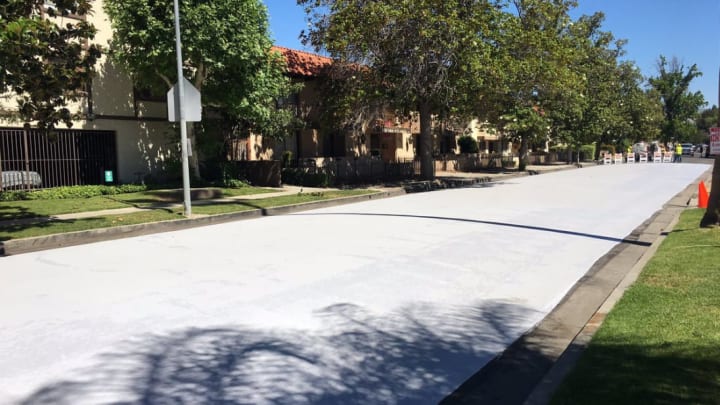The urban heat island effect is a well-documented part of city living. Cities are simply hotter than their surrounding regions, thanks to their miles and miles of dark surfaces like asphalt roads, brick buildings, and black tar roofs that absorb heat during the day. When night falls, these hard surfaces release the heat they’ve been taking in all day, keeping cities several degrees hotter than their greener neighbors long after the sun has set. Green roofs and more parklands help, but they can't cancel out the enormous areas of paved surfaces in most metropolises.
In Los Angeles, authorities are combating the hot temperatures of the park-poor city by installing California’s first reflective road coatings designed to reduce temperatures, according to the Los Angeles Daily News and Curbed Los Angeles.

Called CoolSeal, the gray, reflective coating is designed to keep roads from absorbing heat, cooling their surroundings accordingly. So far, it has been installed on a half-block of road in Canoga Park, and 14 other Los Angeles neighborhoods will be piloting CoolSeal-coated roads by the end of June. To deploy it across the city will cost $40,000 a mile, according to current estimates, and the coating will last about seven years.
There is plenty of asphalt to cover, making the endeavor both expensive and very worthwhile. Los Angeles County has more than 21,700 miles of roads and 200 square miles of parking spaces, resulting in the greatest urban heat island effect in the state of California—increasing temperatures by up to 19°F in some places.
Earlier this year, Los Angeles Mayor Eric Garcetti announced an initiative to lower the average temperature in the Los Angeles area by 3°F over the next two decades. In a two-year test by the city and CoolSeal's manufacturer, the coating decreased average summer temperatures in the parking lot of a sports complex in the Sepulveda Basin recreational area from 160°F to 135-140°F.
A few gray roads could help make sure no one ever tries to fry an egg on the sidewalk again.
